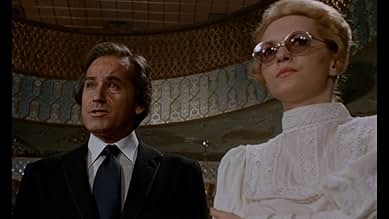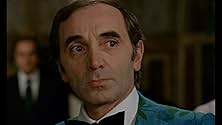Le tribolazioni di Suenaga, un ex campione di boxe che soffre di noia dopo una caduta in disgrazia. Per sopravvivere, accetta l'invito a un match di esibizione contro un comico, che inizia a... Leggi tuttoLe tribolazioni di Suenaga, un ex campione di boxe che soffre di noia dopo una caduta in disgrazia. Per sopravvivere, accetta l'invito a un match di esibizione contro un comico, che inizia a praticare il pugilato per farsi pubblicitaria.Le tribolazioni di Suenaga, un ex campione di boxe che soffre di noia dopo una caduta in disgrazia. Per sopravvivere, accetta l'invito a un match di esibizione contro un comico, che inizia a praticare il pugilato per farsi pubblicitaria.
- Regia
- Sceneggiatura
- Star
- Ilona
- (as Stephane Audran)
- Blore
- (as Gert Froebe)
- U. N. Owen
- (voce)
- …
- Maria
- (solo nei titoli)
- Vendedor
- (as Rick Battaglia)
- (solo nei titoli)
- Trapisondista
- (non citato nei titoli originali)
- Inspector
- (non citato nei titoli originali)
Recensioni in evidenza
The first version of the book,1945's And Then There Were None was a classic,the 1966 adaptation was of passing interest...even the 1989 version had it moments but this 1975 version is a botched job. Not only is the cast turning in "take the money and run" performances,they are in the wrong roles,this makes the killer obvious from the beginnig of the investigation. And one side note...the 1945 film retained the character of religous fanatic Emily Brent portrayed perfectly by Judith Anderson,each subsequent version has cut this wonderful role,replacing her with a rather uninteresting movie star (played dreadfully in this version by Stéphane Audran).
My advice: avoid this film. Read the book,then watch the 1945 version.
Definitely worth a look.
8/10 or *** out of ****
The book's premise is clever. Careful attention is paid to plot detail. Compared to the films, the book's assortment of past crimes and depictions of the characters' attitudes toward them are more varied, subtle, and interesting. The book is the least sentimental about the characters, treating them vaguely and suspiciously. It maintains more of a sense of intensity and purpose than the films. It details why and how Owen carried out the scheme.
However, once the book establishes its imaginative premise, the story becomes thin and formulaic. There is little plot or character development. The storytelling seems flat, frigid, and, at times, slow-paced. There is no lead character to care about. The characters and their past crimes are sketched in summary fashion, and vary widely in quality. There are only two real plot twists. The second creates a major logical problem, which the book acknowledges and tries to overcome by weakly suggesting that the ploy would trick or "rattle" the murderer. The guests' murders are designed to follow the nursery rhyme and little more. Some cosmetic frills aside, the killings show, in themselves, no special cunning, skill, strategic advantage, or plausibility. Owen strikes crudely without detection too effortlessly.
Worst of all, the book (and each film) has nothing serious to say about the powerful themes at the heart of the story. The story is inherently an observation of human nature in a desperate situation. How do the characters behave? How do they try to reason, to survive? Also by its very nature -- as the book's last pages show -- this is a morality play. How is each character a "criminal" and "beyond the law"? Does each get "justice"? Is justice the point, or simply a "lust" to torture and kill? Is the story about breaking the law or enforcing it, about mistakes or abuses in pursuing justice? None of this is meaningfully explored.
In some respects, the films are worse and better than the book. The lighthearted approach of the 1945 and 1965 adaptations is entertaining, but comes at the expense of the story's plausibility and seriousness. Characters confess their secrets and treat the horror unfolding around them as if it were a parlor game. The 1974 film took a decidedly different tone, for good and ill. Gone from both 1945 and 1965 is the comical opening sequence and its catchy, upbeat music. The 1974 film has no opening music, just simple credits and silence invaded by the sound of an approaching helicopter. Its storytelling is cold and clinical. This matches its setting -- a palatial, ornate, immaculate hotel, shuttered and alone amid ruins in the Iranian desert.
The 1974 movie captures more of a sense of fear, menace, and suspense. This includes the selection of Orson Welles to narrate the tape recording charging the guests with past crimes and also the way in which the killings are depicted. The characters are more serious. They are played, with authority, more like real people than caricatures. Richard Attenborough's judge is more stern, less folksy, than in prior versions. Stephane Audran is excellent as actress Ilona, radiant and charming on the surface but troubled and lonely at the core. The maid and butler are believable as hard, smooth con artists. In this important sense, the 1974 version is truest to the book and to those who want to see it presented as a serious mystery (the 1989 adaptation ends well but is low-budget and generally inept).
Overall, however, the 1974 film is less substantial and entertaining than prior versions. The storytelling is so spare and unartful it can feel sterile and uninvolving, lacking in wit, ingenuity, eloquence, and energy. The only moment of real charm comes early and abruptly, when Charles Aznavour performs a song, "Dance in the old-fashioned way," with Audran looking on, enchanted and lovely. By contrast, Aznavour's rendition of Ten Little Indians is disappointing. At "six little Indians," he starts pounding the piano keys and shouting the words, only to let the music die out in anticlimax before "one little Indian."
The outstanding cast is unable to breathe much life into the characters or interactions. Herbert Lom lends an air of authority, reserve, and intelligence (perhaps too much) to the doctor. But his restrained, stiff performance lacks any truly memorable quality, like Walter Huston's buffoonery and charm in 1945 or Dennis Price's vanity and arrogance in 1965, and he is unconvincing as a drunkard. Adolfo Celi can do nothing much with his role, and Gert Froebe little more with his. Elke Sommer, unflatteringly filmed, makes no impression as Vera and has no chemistry with Oliver Reed. Reed gives an impenetrable, impish performance as Lombard.
The 1974 film copies from the imperfect 1965 script, and loses some memorable lines in the translation. Also, by 1974, Lombard has no career. The 1974 film is least faithful to the nursery rhyme. Events are out of Owen's control, as when a snake is let loose, an uncertain murder weapon; one character simply wanders off into the desert; and another screams when a candle blows out, in prior adaptations a diversion engineered by Owen. The location is so faraway and desolate it raises questions about why the guests would be willing to go there, without at least investigating, and how Owen could have made the arrangements. The film lapses back to 1945's short final exposition scene. Re-writes to reflect the end of hanging as a form of capital punishment, and to make Owen choke out incoherent last words, rob that crucial scene of even the inadequate dramatic effect of its predecessors.
Lo sapevi?
- QuizRichard Attenborough was a late replacement for James Mason. Attenborough only took the role to get funding for Gandhi (1982) which would take another seven years before it went before the cameras.
- BlooperAlthough it is supposed to be night when the second victim is killed (darkness can be seen through the windows), it is clearly broad daylight during the exterior search scenes. Vera even mentions it is 'spooky at night'. These scenes were presumably filmed day-for-night, meaning they would be filtered during the editing process to give the impression of darkness. However, the filter was never added.
- Citazioni
U. N. Owen: Ladies and gentlemen, this is your host speaking. My name is U.N. Owen. I have brought you here to charge you with the following crimes: General André Salvé, Croix de Guerre, that you achieved honor from dishonor and sent five men to their certain deaths. Ilona Morgan, actress, that you did bring about the death of your husband in a most cold-blooded and ruthless manner. Doctor Edward Armstrong, that you did kill Mrs. Ivy Benson and betray your sacred trust. Michel Raven, entertainer, that you were guilty of the murder of William and Lisa Stern, whose bodies, when they were found, were almost unrecognizable. Vera Clyde, secretary, that you murdered your sister's fiancee, Richard Barclay, by slow, deliberate poison. Hugh Lombard, that you were guilty of the death of Jennifer Hayes, who was to bear your child. Arthur Cannon, judge of the Queen's bench, that you were responsible for the death of an innocent man, one Edward Seton, who was hanged according to your judgment. Wilhelm Blore, that by perjured testimony, you sent Kord Landor to a cold and lonely death in a prison cell. Otto and Elsa Martino, that you maliciously and brutally caused the death of your invalid employer for your own financial gain. Prisoners at the bar, have you anything to say in your defense?
- Curiosità sui creditiCast, in the order of their disappearance:
- ConnessioniFeatured in Victoria - en film om kärlek (2015)
- Colonne sonoreThe Old Fashioned Way
(Les Plaisirs Démodés) (uncredited)
Music by Georges Garvarentz
French lyrics by Charles Aznavour
English lyrics by Al Kasha and Joel Hirschhorn
Performed by Charles Aznavour
I più visti
- How long is Ten Little Indians?Powered by Alexa
Dettagli
- Data di uscita
- Paesi di origine
- Lingue
- Celebre anche come
- Ten Little Indians
- Luoghi delle riprese
- Shah Abbas Hotel, Isfahan, Iran(Interiors and courtyard of the hotel)
- Aziende produttrici
- Vedi altri crediti dell’azienda su IMDbPro
































